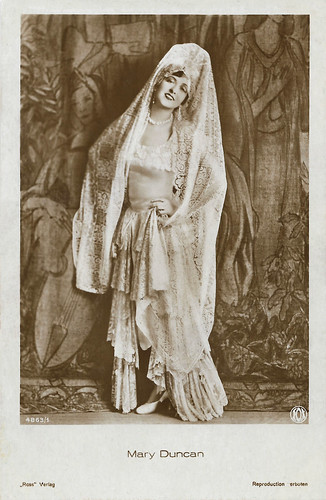
Austrian postcard by Iris Verlag, no. 5690. Photo: Fox-Film.

Austrian postcard by Iris Verlag, no. 5883. Photo: Kahle / Fox.

German postcard by Ross Verlag, no. 4174/1, 1929-1930. Photo: Fox-Film.
A controversial smash hit on Broadway
Mary Duncan was born in Luttrellville, Virginia, in 1894. She was the sixth of eight children born to Capt. William S. Duncan and his wife.
Mary attended Cornell University for two years (or one year) before settling on acting as a career. When she left Cornell, she studied acting under French actress Yvette Guilbert.
Duncan began her career as a child actress playing on the Broadway stage in 1910. Her Broadway credits include 'Welcome to Our City' (1919), 'Face Value' (1921), 'The Egotist' (1922), 'New Toys' (1924), 'Human Nature' (1925), and 'All Wet' (1925).
In 1926 she played "Poppy" in the smash hit and controversial play 'The Shanghai Gesture', in which Florence Reed played her mother, known as "Mother Goddam". Reed's character kills her daughter in a startling end to the play. In 1941, the play was turned into a film with Gene Tierney. Critics praised Duncan's acting in the play and she moved to Hollywood.
In 1927, Mary Duncan made her film debut at Fox in the comedy Very Confidential (James Tinling, 1927) starring Madge Bellamy. The following year, she co-starred with Janet Gaynor in the drama 4 Devils/Four Devils (1928), directed by legendary German director F.W. Murnau. For film historians, the film is one of the most wanted lost films. She starred in the partial-talkie drama The River (Frank Borzage, 1929) opposite Charles Farrell. Much of the film has also been lost.

Austrian postcard by Iris Verlag, no. 5546. Photo: Max Munn Autrey / Fox.

French postcard by Cinémagazine Selection, Paris, no. 941. Photo: Metro-Goldwyn-Mayer.

Italian postcard by G.B. Falci, Milano, no. 398. Photo: Max Munn Autrey / Fox Films Corp. S.A.I.
A bitter memory for everyone concerned
Mary Duncan starred as a Chicago waitress in love with a Minnesota farmer (Charles Farrell) in Murnau's film City Girl (F. W. Murnau, 1930). Murnau shot the film as a silent film in 1928 but City Girl was issued in 1930 in a heavily edited version with awkwardly imposed talking sequences.
What had happened? The Fox Film Studios were subject to a takeover during filming. The new owners requested several changes to City Girl, including the addition of sound sequences which Murnau resisted, and eventually, he walked away to begin filming Tabu, A Story of the South Seas. The sound version of City Girl was released but flopped at the box office and has since been lost.
The MoMA later restored the silent version: "City Girl remained a bitter memory for everyone concerned until the complete silent version was discovered and restored by MoMA, revealing a mature, complex work with a theme that anticipates Murnau’s last masterpiece, Tabu, and lyrical imagery of the plains that influenced Terrence Malick’s Days of Heaven."
After that, Duncan's career hit a lull, according to Wikipedia. In 1931, Florabel Muir wrote in the New York Daily News: "Mary Duncan was in Hollywood nearly all of last year looking for work with little or no luck. She even altered her appearance by having things done to her nose, but still, the producers wouldn't give her a tumble." However, Duncan continued to play substantial parts in films like the romantic comedy The Boudoir Diplomat (Malcolm St. Clair, 1930) with Betty Compson, The Age for Love (Frank Lloyd, 1931) starring Billie Dove, and the drama State's Attorney (George Archainbaud, 1932) starring John Barrymore. Duncan's last film appearance was in Morning Glory (Lowell Sherman, 1933), starring Katharine Hepburn.
In 1933, Duncan married Stephen "Laddie" Sanford, an international polo player and director of the Bigelow-Sanford Carpet Company. After her marriage, she retired from films. They remained married until he died in 1977. She spent much of her remaining years working with several major charities and earned a reputation as a socialite in Palm Beach, Florida. Mary Duncan died in her sleep, aged 98. A niece and great-niece survived her. Duncan was the last known person to have in her possession a copy of the lost Murnau film 4 Devils. Martin Koerber, curator of Deutsche Kinemathek, has speculated that her heirs may still have the valuable print.

German postcard by Ross Verlag, no. 4863/1, 1929-1930. Photo: Fox. Mary Duncan in Romance of the Rio Grande (Alfred Santell, 1929).

German postcard by Ross Verlag, no. 5207/1, 1930-1931. Photo: Fox.

British postcard in the Picturegoer Series, London, no. 442.
Sources: Florabel Muir (Daily News), MoMA, Wikipedia and IMDb.
No comments:
Post a Comment